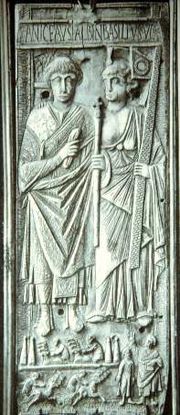
Anicius Faustus Albinus Basilius
Encyclopedia

Biography
His origins are unknown, although its name suggests it belonged to an aristocratic Roman families of DeciiDecius (gens)
Decius is an ancient Roman nomen; notable individuals of the gens Decia include:**Publius Decius Mus , son of Quintus, consul in 340 BC, fought the Battle of Vesuvius...
and of the Anicii
Anicia (gens)
The gens Anicia was a plebeian family at Rome, mentioned first towards the end of the 4th century BC The first of the Anicii under to achieve prominence under the Republic was Lucius Anicius Gallus, who conducted the war against the Illyrii during the Third Macedonian War, in 168 BC.A noble family...
: it is likely that he was the grandson of the consul of 480, Caecina Decius Maximus Basilius
Caecina Decius Maximus Basilius
Caecina Decius Maximus Basilius , was a Roman politician. He was the first consul appointed under Odoacer's rule , and afterwards was Praetorian prefect of Italy. He is best known for presiding over the papal election of Pope Felix III....
, and perhaps he was the son of the consul of 493, Albinus
Albinus (consul 493)
Albinus, or Caecina Decius Faustus Albinus, was a Roman politician during the reign of Theodoric the Great. He held the consulship with Flavius Eusebius in 493...
.
On 1 January 541 he took the consulate in Constantinople
Constantinople
Constantinople was the capital of the Roman, Eastern Roman, Byzantine, Latin, and Ottoman Empires. Throughout most of the Middle Ages, Constantinople was Europe's largest and wealthiest city.-Names:...
without colleague. The consular diptych of Albinus Basilius lists his titles at the time of the consulate: vir inlustris, comes domesticorum, patricius and ordinary consul.
When the King of the Ostrogoths Totila
Totila
Totila, original name Baduila was King of the Ostrogoths from 541 to 552 AD. A skilled military and political leader, Totila reversed the tide of Gothic War, recovering by 543 almost all the territories in Italy that the Eastern Roman Empire had captured from his Kingdom in 540.A relative of...
overcame the Byzantine
Byzantine Empire
The Byzantine Empire was the Eastern Roman Empire during the periods of Late Antiquity and the Middle Ages, centred on the capital of Constantinople. Known simply as the Roman Empire or Romania to its inhabitants and neighbours, the Empire was the direct continuation of the Ancient Roman State...
defences and entered the city in December 546, Basilius, along with Rufius Petronius Nicomachus Cethegus
Rufius Petronius Nicomachus Cethegus
Rufius Petronius Nicomachus Cethegus was a politician of the Western Roman Empire. He was appointed consul for 504, and held the post without a colleague...
, the president of the Senate
Roman Senate
The Senate of the Roman Republic was a political institution in the ancient Roman Republic, however, it was not an elected body, but one whose members were appointed by the consuls, and later by the censors. After a magistrate served his term in office, it usually was followed with automatic...
, and Decius
Decius (consul 529)
Flavius Decius was a politician of the Eastern Roman Empire. A member of the Decia gens, he was appointed Consul Ordinarius for 529 without colleague....
fled Rome with general Bessas. According to the Liber Pontificalis
Liber Pontificalis
The Liber Pontificalis is a book of biographies of popes from Saint Peter until the 15th century. The original publication of the Liber Pontificalis stopped with Pope Adrian II or Pope Stephen V , but it was later supplemented in a different style until Pope Eugene IV and then Pope Pius II...
, Basilius and Cethegus reached Constantinople
Constantinople
Constantinople was the capital of the Roman, Eastern Roman, Byzantine, Latin, and Ottoman Empires. Throughout most of the Middle Ages, Constantinople was Europe's largest and wealthiest city.-Names:...
where the Emperor Justinian consoled them "and enriched them as befitted Roman consuls."
A consular diptych
Consular diptych
In Late Antiquity a consular diptych was a particular type of diptych which could function as a writing tablet but was also intended as a deluxe commemorative object, commissioned by a consul ordinarius and then distributed to reward those who had supported his candidature as...
bearing the name "Anicius Faustus Albinus Basilius" was first proposed to refer to him by Filippo Buonarroti
Filippo Buonarroti
Filippo Buonarroti , the great-grandnephew of Michelangelo Buonarroti, was a Florentine official at the court of Cosimo III, Grand Duke of Tuscany and an antiquarian, whose Etruscan studies, among the earliest in that field, inspired Antonio Francesco Gori...
in 1716. This identification was generally accepted until 1896 when H. Graeven argued it belonged to Caecina Decius Maximus Basilius, the western consul of 480, based on stylistic arguments. More recently Alan Cameron and Diane Schauer have defended Buonarotti's identification.
Further reading
- Martindale, John Robert, John Morris, and Arnold Hugh Martin Jones, The Prosopography of the Later Roman Empire, Volume 3, Cambridge University Press, 1971, ISBN 0521201608, pp. 174-175.

